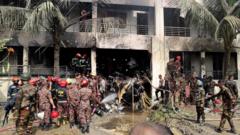In a significant development in Bangladeshi politics, the government has officially banned all activities of the Awami League, the party formerly led by ousted Prime Minister Sheikh Hasina, citing ongoing legal cases against the party and its leaders.
Bangladesh Bans Awami League Amid Ongoing Political Turmoil

Bangladesh Bans Awami League Amid Ongoing Political Turmoil
The interim government takes decisive action against the ousted party following a series of protests and demands for accountability.
The announcement, made on May 11, 2025, indicates that the ban will remain in effect until the conclusion of trials at the International Crimes Tribunal, concerning alleged atrocities linked to the Awami League during protests in 2024. The move by Nobel laureate Muhammad Yunus and his interim administration follows a tumultuous period characterized by mass uprisings and nationwide dissent against the previous government.
The decision arose after the recent violent incident involving Hasnat Abdullah, a leader of last summer's protest movement, which led to renewed calls from students and activists to further escalate measures against the Awami League. Mr. Abdullah's attack incited protests over the weekend, rallying hundreds of individuals, including those injured during the protests last year, demanding the party's prohibition.
The government justified the legislative amendments under the Anti-Terrorism Act, which now permits entire political entities to face legal action for crimes potentially committed by their members. Law Minister Asif Nazrul confirmed the total ban on Awami League activities, emphasizing the need for accountability as the tribunal assesses accusations of violence perpetrated during the protests last summer.
A prior report from an inquiry commission accused Ms. Hasina’s government of facilitating mass disappearances during her extensive tenure. In a contentious development, a UN committee reported that during the unrest, law enforcement, alongside Awami League affiliates, was responsible for the deaths of at least 1,400 individuals, including children. The Awami League responded to the ban by questioning the legitimacy of the interim government's authority.
The political crisis in Bangladesh traces back to the summer of 2024, when student protests against an unpopular job reservation system ignited widespread hostility towards Hasina's government. The situation deteriorated further after a protester's death led to severe governmental crackdowns, including internet blackouts and mass arrests. Sheikh Hasina ultimately fled Bangladesh, paving the way for Mr. Yunus to rise to power, and catalyzing a new political era marked by continued protests and demands for justice.
The decision arose after the recent violent incident involving Hasnat Abdullah, a leader of last summer's protest movement, which led to renewed calls from students and activists to further escalate measures against the Awami League. Mr. Abdullah's attack incited protests over the weekend, rallying hundreds of individuals, including those injured during the protests last year, demanding the party's prohibition.
The government justified the legislative amendments under the Anti-Terrorism Act, which now permits entire political entities to face legal action for crimes potentially committed by their members. Law Minister Asif Nazrul confirmed the total ban on Awami League activities, emphasizing the need for accountability as the tribunal assesses accusations of violence perpetrated during the protests last summer.
A prior report from an inquiry commission accused Ms. Hasina’s government of facilitating mass disappearances during her extensive tenure. In a contentious development, a UN committee reported that during the unrest, law enforcement, alongside Awami League affiliates, was responsible for the deaths of at least 1,400 individuals, including children. The Awami League responded to the ban by questioning the legitimacy of the interim government's authority.
The political crisis in Bangladesh traces back to the summer of 2024, when student protests against an unpopular job reservation system ignited widespread hostility towards Hasina's government. The situation deteriorated further after a protester's death led to severe governmental crackdowns, including internet blackouts and mass arrests. Sheikh Hasina ultimately fled Bangladesh, paving the way for Mr. Yunus to rise to power, and catalyzing a new political era marked by continued protests and demands for justice.


















